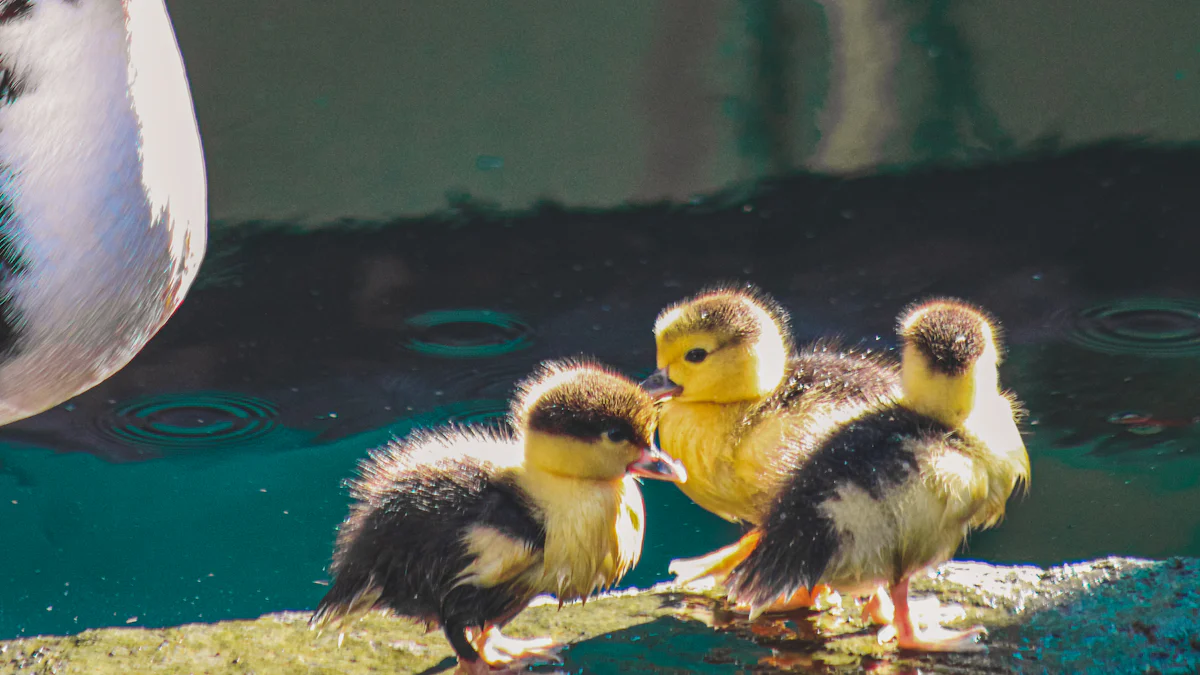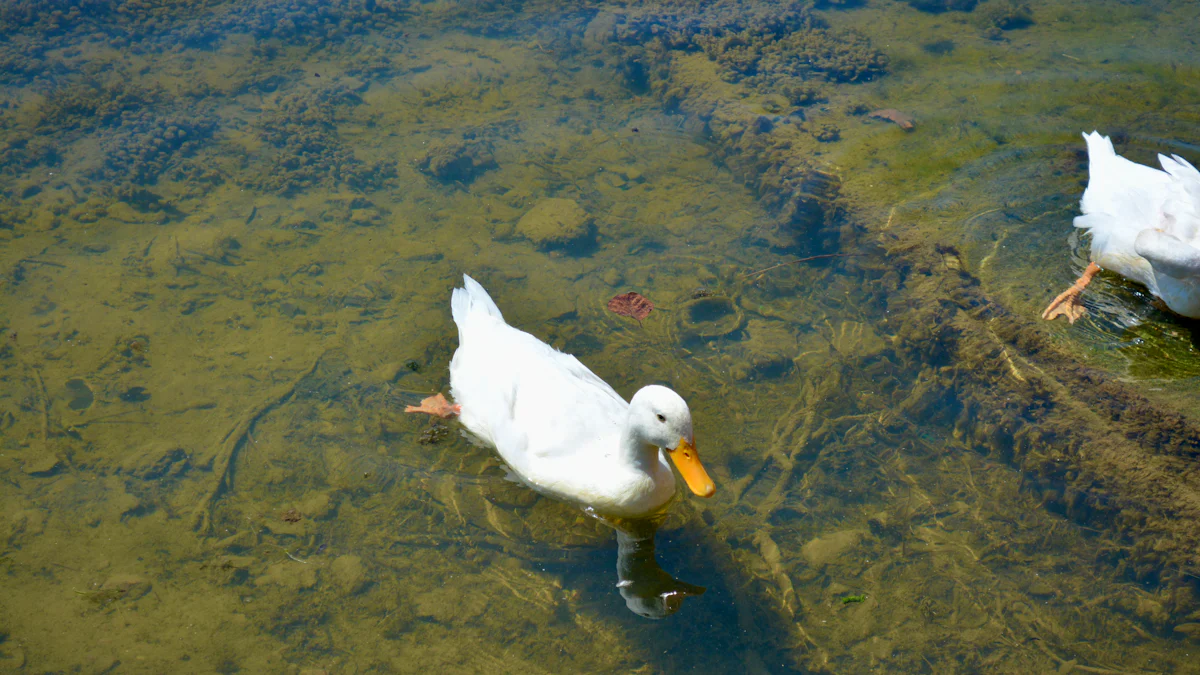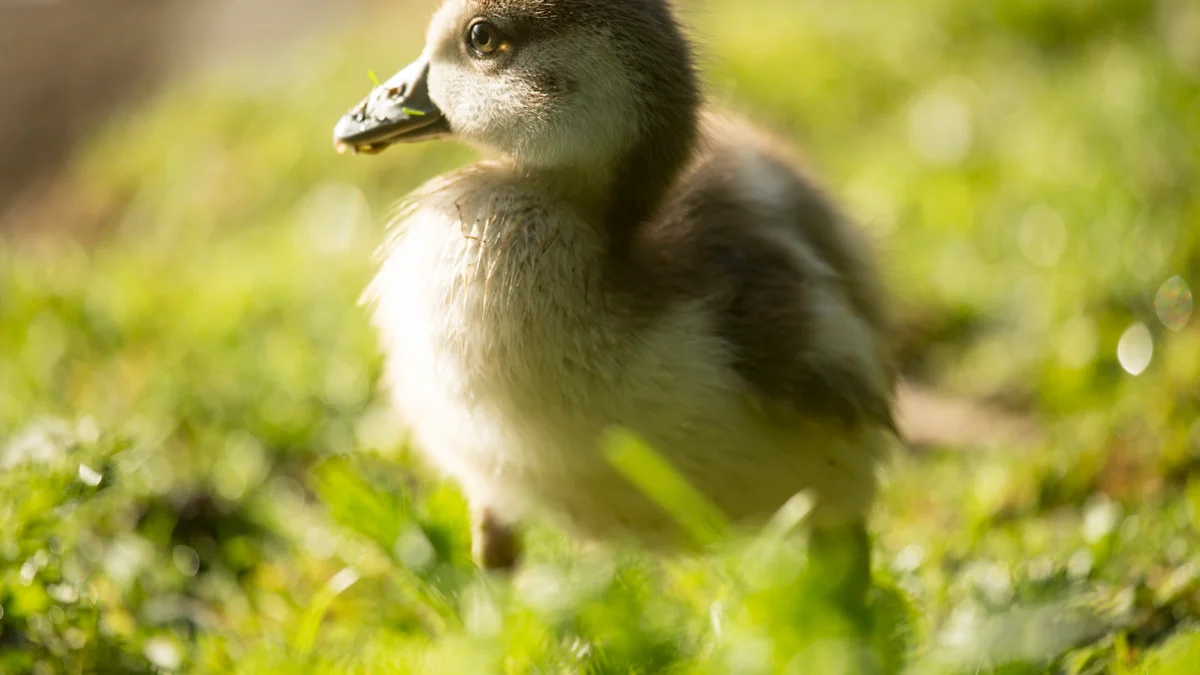
Can ducks eat dried mealworms? Absolutely! Ducks love these protein-packed treats, and they can safely enjoy them as part of their diet. Protein is essential for ducks, aiding in feather growth, muscle development, and providing extra energy during breeding seasons. Since ducks naturally forage for insects in the wild, dried mealworms are a great way to mimic their natural diet. By offering dried mealworms in moderation, you’re giving your ducks a healthy and delicious snack that supports their overall well-being.
Key Takeaways
- Dried mealworms are a nutritious treat for ducks, packed with protein, healthy fats, and essential vitamins and minerals.
- Feed dried mealworms in moderation, limiting them to about 10% of your duck’s daily diet to prevent health issues.
- Offer dried mealworms two to three times a week as an occasional snack, ensuring a balanced diet with other foods.
- Serve mealworms creatively by sprinkling them on water, mixing with regular feed, or scattering on the ground to encourage foraging.
- Choose high-quality mealworms from reputable suppliers to avoid harmful additives and ensure your ducks’ safety.
- Monitor your ducks for any adverse reactions after introducing mealworms, and adjust their diet as needed.
- Incorporate a variety of foods, including fresh produce and alternative protein sources, to keep your ducks healthy and happy.
Nutritional Benefits of Dried Mealworms for Ducks

Why Protein Matters for Ducks
Protein plays a vital role in keeping your ducks healthy and thriving. It supports feather growth, muscle development, and energy production. Ducks rely on protein to maintain their strength and mobility, especially during molting or breeding seasons when their bodies need extra nutrients. In the wild, ducks naturally forage for insects, which are rich in protein. By offering dried mealworms, you’re providing a similar source of nutrition that mimics their natural diet. This makes mealworms an excellent way to supplement their protein intake.
Key Nutrients in Dried Mealworms
Dried mealworms aren’t just about protein—they’re packed with other essential nutrients too. They contain healthy fats that give your ducks a quick energy boost, especially during colder months. These fats help ducks stay warm and active when temperatures drop. Mealworms also provide important vitamins like B12, which supports energy metabolism, and minerals such as iron and potassium, which contribute to overall health. Including these nutrients in your ducks’ diet helps them stay strong, energetic, and resilient.
Here’s a quick breakdown of what dried mealworms offer:
- Protein: Builds muscles and feathers.
- Healthy fats: Provides energy and insulation.
- Vitamins (like B12): Boosts energy and supports bodily functions.
- Minerals (like iron and potassium): Strengthens bones and improves overall health.
Seasonal Benefits of Feeding Mealworms
Dried mealworms can be especially beneficial during certain times of the year. In winter, ducks burn more energy to stay warm. The fats and protein in mealworms help them maintain their energy levels and body heat. During molting season, when ducks shed old feathers and grow new ones, they need extra protein to support this process. Mealworms can also be a great treat during breeding season, as they provide the nutrients ducks need for egg production and overall vitality.
By adjusting the amount of mealworms you feed based on the season, you can ensure your ducks get the right nutrients when they need them most. Whether it’s winter, molting, or breeding time, mealworms can give your ducks the extra boost they need to stay healthy and happy.
How to Feed Dried Mealworms to Ducks

Recommended Portion Sizes
When feeding dried mealworms to your ducks, portion control is essential. These treats are nutrient-dense, so a little goes a long way. A good rule of thumb is to limit mealworms to about 10% of your duck’s daily diet. For an average-sized duck, this means offering a small handful of mealworms per day. Overfeeding can lead to an unbalanced diet, so keep the portions small and consistent.
If you’re feeding ducklings, start with even smaller amounts. Their developing digestive systems need time to adjust to new foods. Sprinkle just a few mealworms into their regular feed to introduce them gradually. By sticking to appropriate portion sizes, you’ll ensure your ducks get the benefits of mealworms without overloading on protein or fats.
How Often to Feed Dried Mealworms
Dried mealworms should be treated as an occasional snack rather than a daily staple. Offering them two to three times a week is ideal. This frequency allows your ducks to enjoy the nutritional benefits without disrupting their balanced diet. Ducks thrive on variety, so it’s important to rotate mealworms with other treats like leafy greens, fruits, or grains.
During certain seasons, you might adjust how often you feed mealworms. For example, in winter or molting season, ducks may benefit from slightly more frequent servings due to their increased energy and protein needs. Always observe your ducks’ behavior and health to determine if adjustments are necessary.
Best Ways to Serve Dried Mealworms
Serving dried mealworms can be fun and interactive for both you and your ducks. Here are some of the best ways to offer them:
- Sprinkle on Water: Ducks love foraging in water. Toss a handful of mealworms into a shallow dish or pond. This mimics their natural feeding behavior and keeps them entertained.
- Mix with Regular Feed: Combine mealworms with their usual pellets or grains. This ensures they still consume their primary food while enjoying the treat.
- Hand-Feed for Bonding: If you want to build trust with your ducks, try hand-feeding them mealworms. They’ll quickly associate you with their favorite snack.
- Scatter on the Ground: Spread mealworms across the ground to encourage natural foraging. This keeps your ducks active and engaged.
Always ensure the mealworms are clean and free from any contaminants. Choose high-quality dried mealworms from reputable suppliers to avoid potential health risks. By serving them in creative ways, you’ll keep your ducks happy and healthy while adding variety to their routine.
Can Ducks Eat Dried Mealworms Safely? Safety Considerations and Precautions
Risks of Overfeeding Mealworms
While dried mealworms are a nutritious treat, overfeeding them can lead to problems for your ducks. Mealworms are high in protein and fat, which are beneficial in moderation but can cause health issues when consumed excessively. Too much protein may strain your ducks’ kidneys, leading to potential long-term damage. Excess fat can contribute to obesity, making it harder for ducks to move and forage naturally.
To avoid these risks, stick to the guideline of feeding mealworms as no more than 10% of your ducks’ daily diet. This ensures they get the benefits of mealworms without compromising their overall health. Always balance their diet with other foods like grains, vegetables, and commercial duck feed. A varied diet keeps your ducks healthy and prevents nutritional imbalances.
Choosing High-Quality Mealworms
Not all dried mealworms are created equal. The quality of the mealworms you choose directly impacts your ducks’ health. Low-quality mealworms may contain harmful additives, pesticides, or contaminants that could make your ducks sick. Always purchase mealworms from reputable suppliers who prioritize safety and quality.
Look for mealworms labeled as “human-grade” or specifically marketed for animal consumption. These options are usually free from harmful chemicals. Check the packaging for freshness and avoid mealworms with an unusual smell or appearance. By choosing high-quality mealworms, you ensure your ducks enjoy a safe and nutritious treat.
Observing Ducks for Adverse Reactions
Even though dried mealworms are generally safe, it’s important to monitor your ducks after introducing them to this treat. Some ducks may have individual sensitivities or allergies. Watch for signs like lethargy, changes in appetite, or unusual droppings. These could indicate that the mealworms aren’t agreeing with them.
If you notice any adverse reactions, stop feeding mealworms immediately and consult a veterinarian. Gradually reintroduce them in smaller amounts to see if your ducks can tolerate them better. Regular observation helps you catch potential issues early and ensures your ducks stay happy and healthy.
By following these precautions, you can confidently answer the question, “Can ducks eat dried mealworms?” Yes, they can, as long as you feed them responsibly and pay attention to their needs.
Alternatives to Dried Mealworms for Ducks
Fresh Produce Options
Fresh produce can be a fantastic addition to your ducks’ diet. Ducks enjoy a variety of fruits and vegetables, which provide essential vitamins and minerals. Leafy greens like lettuce, kale, and spinach are excellent choices. These greens are rich in nutrients and mimic the plants ducks might forage for in the wild. You can also offer small pieces of fruits like watermelon, blueberries, or apples (without seeds). These fruits serve as hydrating and nutritious treats.
Root vegetables like carrots or sweet potatoes, when cooked and chopped, are another great option. They are easy to digest and packed with vitamins. Always wash produce thoroughly to remove dirt or pesticides. By including fresh produce, you give your ducks a natural and healthy way to diversify their meals.
Other Protein Sources for Ducks
If you’re looking for alternatives to dried mealworms, there are plenty of other protein-rich options. Cooked eggs, for example, are a simple and affordable source of protein. You can scramble or hard-boil them, then chop them into small pieces for your ducks to enjoy. Eggs contain essential amino acids that support muscle and feather development.
Insects like black soldier fly larvae (BSF) are another excellent choice. Studies have shown that BSF larvae not only provide high-quality protein but also contain chitin, a compound that supports ducks’ immune systems and gut health. You can purchase BSF larvae online or at specialty pet stores. Additionally, small amounts of cooked fish or shrimp can be offered occasionally. These options mimic the natural diet of ducks and ensure they get the amino acids they need for optimal health.
Balanced Commercial Duck Feed
A well-balanced commercial duck feed should always form the foundation of your ducks’ diet. These feeds are specifically formulated to meet the nutritional needs of ducks at different life stages. They contain the right balance of protein, carbohydrates, fats, vitamins, and minerals. Look for high-quality brands that use natural ingredients and avoid artificial additives.
Commercial feeds are convenient and ensure your ducks receive consistent nutrition. You can pair these feeds with fresh produce or protein treats like mealworms or BSF larvae to add variety. By relying on a balanced feed as the main component of their diet, you help maintain your ducks’ overall health and vitality.
“A varied diet is key to keeping ducks healthy and happy. Combining fresh produce, alternative protein sources, and commercial feed ensures your ducks thrive.”
Dried mealworms are a fantastic treat for ducks when you feed them in moderation. Packed with protein, fats, and essential nutrients, they support your ducks’ health and energy levels. By sourcing high-quality mealworms and following proper feeding practices, you ensure your ducks stay happy and thriving. Remember, variety is key to a balanced diet. Alongside mealworms, explore other safe treats like fresh produce or alternative protein sources to keep your ducks’ meals exciting and nutritious.
FAQ
Can You Feed Ducks Dried Mealworms?
Yes, you can feed ducks dried mealworms. These treats are packed with protein, which is essential for their growth, feather development, and energy needs. Dried mealworms are especially beneficial during breeding or molting seasons when ducks require extra nutrients. However, always ensure they are part of a balanced diet and not the sole food source.
Are Dried Mealworms Better Than Live Mealworms for Ducks?
Both dried and live mealworms are safe and nutritious for ducks. Ducks often prefer live mealworms because they mimic their natural foraging behavior. However, dried mealworms are more convenient for you as they don’t require care or feeding. They are also easier to store and tend to be more affordable. Either option works well as long as the mealworms are free from harmful additives.
How Often Should You Feed Ducks Dried Mealworms?
You should feed dried mealworms to your ducks two to three times a week. Treat them as an occasional snack rather than a daily staple. This frequency ensures your ducks enjoy the benefits of mealworms without disrupting their balanced diet. Adjust the feeding schedule during colder months or molting seasons when ducks may need extra protein.
What Are the Benefits of Feeding Ducks Dried Mealworms?
Dried mealworms provide ducks with a concentrated source of protein, healthy fats, and essential nutrients like B12 and iron. These nutrients support muscle growth, feather health, and energy production. Mealworms are particularly helpful during winter, molting, or breeding seasons when ducks need additional nutrition to stay healthy and active.
Can Ducklings Eat Dried Mealworms?
Yes, ducklings can eat dried mealworms, but you should introduce them gradually. Start with small amounts mixed into their regular feed. Ducklings have sensitive digestive systems, so moderation is key. As they grow, you can slowly increase the portion size while ensuring their primary diet remains balanced.
How Do You Serve Dried Mealworms to Ducks?
You can serve dried mealworms in several fun ways:
- Sprinkle them on water to mimic natural foraging.
- Mix them with regular feed to ensure a balanced meal.
- Hand-feed them to build trust and bond with your ducks.
- Scatter them on the ground to encourage active foraging.
Choose the method that works best for you and your ducks while keeping their feeding routine engaging.
Are There Risks to Overfeeding Dried Mealworms?
Overfeeding dried mealworms can lead to health issues. Too much protein may strain your ducks’ kidneys, while excess fat can cause obesity. To avoid these risks, limit mealworms to no more than 10% of their daily diet. Always balance their meals with grains, vegetables, and commercial duck feed.
How Can You Ensure the Quality of Dried Mealworms?
Always purchase dried mealworms from reputable suppliers. Look for products labeled as “human-grade” or specifically made for animal consumption. Avoid mealworms with unusual smells or discoloration. High-quality mealworms are free from harmful chemicals and provide a safe, nutritious treat for your ducks.
What Are Some Alternatives to Dried Mealworms?
If you’re looking for variety, try these alternatives:
- Fresh produce like leafy greens, watermelon, or blueberries.
- Other protein sources such as cooked eggs or black soldier fly larvae.
- Commercial duck feed designed to meet all their nutritional needs.
These options ensure your ducks enjoy a diverse and balanced diet.
Why Should You Include Dried Mealworms in a Duck’s Diet?
Dried mealworms mimic the natural diet of ducks by providing a rich source of protein and nutrients. They enhance your ducks’ overall health, energy levels, and feather quality. By including mealworms in moderation, you give your ducks a treat they love while supporting their well-being.


